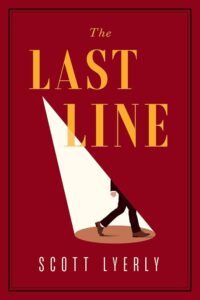I blinked a lot as a kid. Like, a lot a lot. And my head jerked, like a nod, only quicker and sharper and repeatedly. And I grunted. I didn’t even know I grunted until someone pointed it out to me. I think I was eleven, maybe twelve. There were other tics, some brief, some embarrassing, some big, some small.
But I never involuntarily swore.
I have Tourette syndrome. I wasn’t diagnosed with TS until I was eighteen. Perhaps if I had been involuntary swearing like a sailor at the age of eleven (the official term is “coprolalia”), I might have been diagnosed earlier.
I got questions; people would ask why I was making noises, and in one case a classmate asked if I were doing a gorilla impersonation. The answer was “no”, but I also had no answer for what it is I was doing.
When I was eighteen, my mother, a teacher at the time, noticed a brochure on the desk in the school counselor’s office. I don’t know what it said, but it struck a chord because she started reading it and thought “This sounds like Scott.” A year later I had a diagnosis. And a sense of relief. What I had, the grunting, the blinking, the head bobbing and sniffing, my body twitching as I tried to sleep—these were not things I could control (I had been asked to). These were not bad habits (I got accused of that quite a bit). These weren’t anything therapy could help (though there has been some interesting success in the last few decades with Comprehensive Behavioral Intervention for Tics, or CBIT).
They were involuntary. They were, and are, Tourette syndrome.
Usually, when I’m in public, I do the barest minimum to satisfy the itch. But if you watch carefully, you can see it. Like how I have to touch the mouth of a soda bottle to the tip of my nose before drinking. Or how my right hand sometimes sneaks up to my nose, the flat of my index finger crushes the end of my nose. (Always the right hand. Never the left.) Or how I grimace when I do this. Or the ones no one can see, like clenching my abdomen muscles, or squeezing my right leg muscles. Or the grunting sniff I make when eating that makes dining such an unpleasant experience. That’s a recent one, and isn’t it a joy. I’ve aspirated a lot of food in the last year.
This is who I am, and it’s different from the next person with Tourette syndrome. No two cases are the same. Every person with Tourette syndrome has their own set of tics, unique to them. One person might blink their eyes and bob their head, and the other might wrinkle their nose and shrug their shoulders.
* * *
To a degree, I understand why this makes it hard to craft a realistic character in fiction with Tourette syndrome. Every case is different and unique. So, writers have often chosen the easy way out, picking up on the extremes of the disorder to create a distinguishing characteristic that tells the reader “THIS CHARACTER HAS TOURETTE SYNDROME”.
To writers who do this: please stop.
I was in my twenties, working for Borders Books & Music (RIP!) when it first occurred to me to look up works of fiction featuring characters with Tourette syndrome. There were very few. The most prominent one–and arguably still the most famous–is Motherless Brooklyn. I picked it up and read it, hoping to see a character I could relate to.
What I got was Lionel Essrog.
I’m not trying to bash Jonathan Lethem as an author. He’s a very fine writer. And while he nailed some things about Tourette syndrome in Motherless Brooklyn, overall, he missed the mark. His own admission that there is nothing to the character except his Tourette’s syndrome when Lionel himself states that he has a tic that forces him to “relate everything to my Tourette’s”; he describes New York as a “Tourettic city,” whatever that means; he states that “[c]onspiracies are a version of Tourette syndrome” (huh?); and he feels the “wild call for symmetry,” which is far closer to obsessive-compulsive disorder than Tourette syndrome.
Also, Lethem once described Brooklyn as “his Tourettes”. Yeah. . .that’s not a thing.
Note: Tourette syndrome, while listed in the DSM as a psychiatric disorder, is also, and primarily, a motor disorder. As the UCLA Medical School notes, “unlike many psychiatric disorders—such as depression, anxiety, or schizophrenia—it’s not really a disorder of cognition or emotion.”
When an author decides to create a character with a disorder, especially a neurodivergent one, too often what we get are stereotypes. Less than 1% of 1% of people diagnosed with TS have coprolalia, and yet somehow that’s what you see on TV (e.g. South Park or Dr. Phil or Ally McBeal) or read in books (e.g. Motherless Brooklyn or Icy Sparks). In these mediums, the character is only his or her disorder. It’s the driving force behind why they do things, the only reason they take the actions they do. And that needs to change.
In many ways this is no different than writing every autistic character as a Rain Man knockoff.
Please. Just don’t.
But also, importantly, let’s celebrate the instances where they got it right. Mare of Easttown treats Tourette syndrome as one aspect of a large mental health issue, all of which need to be addressed. One character’s <!SPOILER ALERT!> suicide is not because of TS, but because of a range of mental health issues. The character happened to have TS as well. And when that character’s young son begins to show an unusual amount of blinking, they speak with a doctor, concerned about early intervention to avoid further tragedy and grief. Tackling mental health along with these outward physical manifestations is true to life, not to mention responsible.
* * *
In my own book, I set out to create a character who has Tourette syndrome. . .and a mortgage. . .and the worries of a small business. . .and deep meaningful friendships. . .and challenges beyond just TS. When I wrote The Last Line, I wanted to represent Tourette syndrome in a way that showed it as one aspect of the character, not the only aspect.
I would encourage writers who want to use TS, or some other neurodivergent condition, in their creation to consider making it one facet of a character’s person, rather than having it define that character. For many of us, it’s not some all-consuming thing. It’s just one piece of who we are. It makes us different, but so does our eye color, the length of our arms, the ability to roll the tongue. Having Tourette syndrome, or some other syndrome, disorder, disability, and the like, doesn’t define us.
By doing a better job of character creation, our characters become less of a punchline and more real. And what writer doesn’t want realistic characters for their fiction?


















